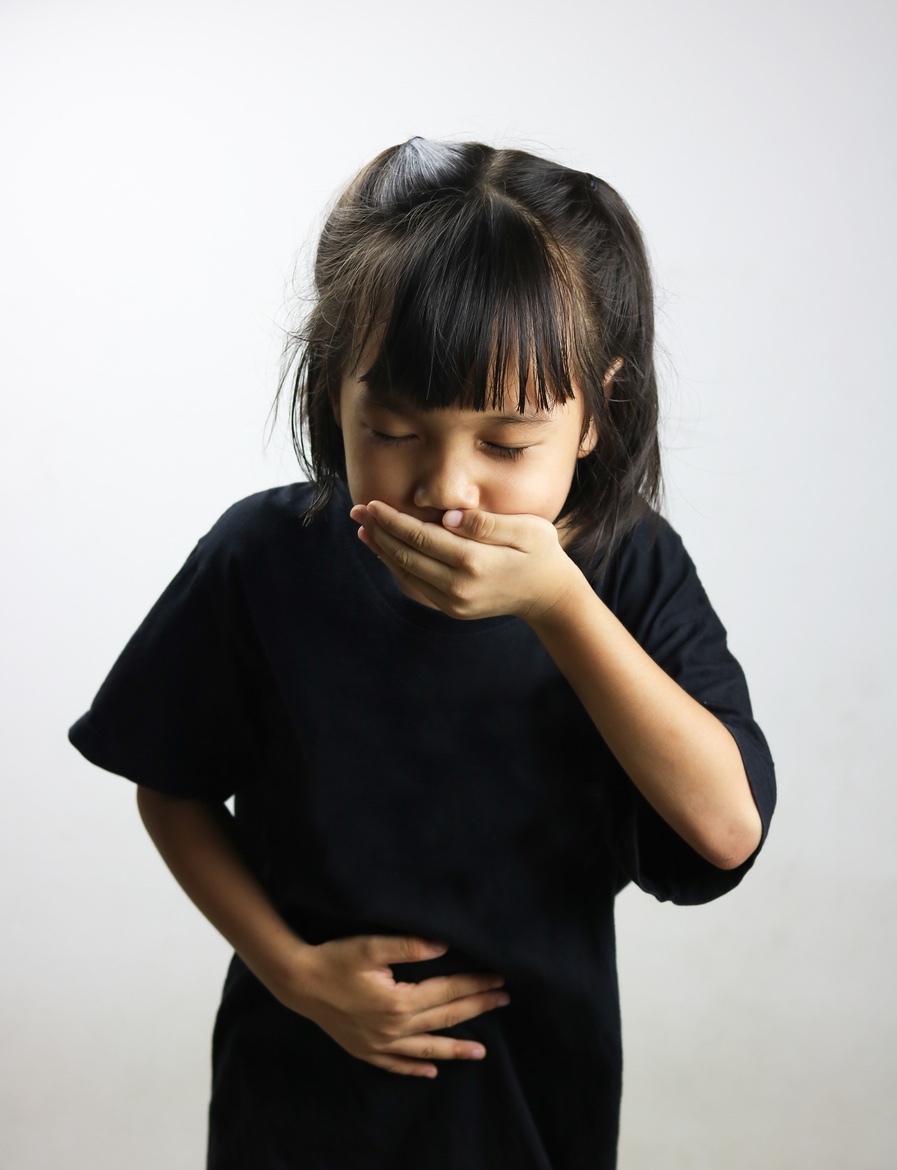It’s natural to worry when your child isn’t able to eat or keep food down. Vomiting in children can be scary for parents!
The good news is that most of the time when a child is throwing up, it isn’t anything serious. You can usually help ease your child’s discomfort with home treatment until the episode passes.
But occasionally, vomiting in children is a symptom of a more serious problem. So it’s important for parents to know what signs to watch out for.
Look, if you’ve got kids you’re going to be dealing with a lot of vomit over the years. That’s just a fun perk of parenting.
Which is why we’re giving you the ultimate guide to help you know when it’s just a bug, or when you need to get a doctor involved.
We’ll also share some effective home remedies you can use to help your little one feel better.
A Parent’s Guide To Vomiting In Children
Vomiting Vs. Spitting Up
When it comes to infants, you need to determine if they are truly vomiting or just “spitting up”.
Vomiting is forceful and repeated. Spitting up usually occurs after feeding and doesn’t cause visible discomfort.
Spitting up is totally normal for babies. It may mean they gulped air, took in too much formula, or their formula is upsetting their stomach.
Spitting up isn’t anything to worry about unless it increases in frequency or changes to full-blown vomiting, in which case contact your doctor.
Infant Vomiting – Warning Signs:
If you’ve determined you’re dealing with infant vomiting, as opposed to just normal spitting up, there are some warning signs you need to watch out for.
A baby throwing up can easily get dehydrated. Or the vomiting could indicate another, more serious condition.
If your parental instincts ever tell you something is “off”, give your healthcare provider a call.
You know your baby better than anyone and with infants it is always best to err on the side of caution.
You definitely want to call or take your baby to the doctor if you see any of the following warning signs:
- An infant under 10 weeks of age forcefully vomiting large amounts of formula or fluid and appears dehydrated. This type of vomiting may indicate a blockage at the end of the stomach called pyloric stenosis. See a doctor or get to an ER RIGHT AWAY. This condition is potentially serious and may require surgery.
- Infant (under 2 years old) crying uncontrollably, may be pulling their knees to their chest, has red-colored diarrhea, and vomits all liquids. Your child may have an obstruction of the intestines called intussusception. Contact your doctor right away.
- Baby (under 2 years) vomiting continuously for 6-12 hours with no other symptoms. Little ones can dehydrate fast, so if vomiting continues this long contact your doctor to be safe.
Before taking your baby to the doctor, be sure to note the color of their vomit and the number of times they have vomited. This information may help determine the cause.
Causes Of Vomiting In Children:
Vomiting in children age 2 and above is usually caused by some type of stomach flu virus (gastroenteritis).
Vomiting can also be caused by food poisoning, intestinal illnesses, a severe cough/cold, bladder infection, intestinal obstruction, or injury from a fall.
The cause of vomiting in children is often hard to determine at first, because the initial symptoms generally present the same way; profuse vomiting every 5 to 45 minutes for 1 to 12 hours.
Understanding how the various vomiting causes run their course, and what symptoms to watch out for, will help you determine if and when to take your child to the doctor.
Of course, if you have any questions or concerns, you should always contact your doctor and let them determine if your child needs to be seen or not.
Here’s some help to determine what might be causing your child’s vomiting based on their symptoms:
Stomach Flu Virus :
This usually presents as a sudden onset of vomiting, and may be accompanied by a fever and some stomach pain. Diarrhea usually begins after the first 12 hours.
The vomiting generally lasts for 12 hours, but may continue for 72 (the worst!).
A flu is a virus, so there’s not much you can do except let it run its course and make your child as comfortable as possible using our home treatments below.
RELATED: Effective Sore Throat Remedies For Kids!
Food Poisoning:
First off, don’t panic. This doesn’t actually mean your child ate “poison”, it just means there was some bad bacteria in something they ate (such as spoiled mayo or salad dressing, or undercooked chicken, beef or fish).
Unlike the flu, with food poisoning there’s usually NO fever and it happens a few hours after eating a potential source of “bad” food. Like after a picnic, party, or restaurant meal.
Vomiting may be accompanied by stomach cramps. The vomiting generally doesn’t last beyond 12 hours.
Important Note: If you have a toddler in the house that starts vomiting, you want to be sure they aren’t suffering from ACTUAL poisoning due to swallowing household liquids, medicines, or other toxins.
Look around for evidence of open packaging, empty containers, or spills. If your child swallowed something, there may be pills in their vomit or the vomit may have an unusual color, appearance, or smell.
If you suspect your child swallowed something toxic, call 911 or take them to the ER immediately.
If you have the packaging the medicine or household liquid came in, be sure to bring it with you.
Bladder Infection:
Occasionally, vomiting in children will be a side effect of a bladder infection.
If your child has a fever for several days with occasional vomiting, and they complain of their urine burning or it has a foul odor, this may be the cause. Contact your doctor.
Other Intestinal or Bacterial Illnesses:
If it’s not the stomach flu, it could be a number of other illnesses such as Rotavirus, E-Coli, or Salmonella.
The vomiting pattern for all of these is similar to the flu, so you may never know the real culprit.
But it’s not really necessary, since treatment is the same (see below).
Severe Cough or Cold:
Kids may occasionally vomit after an especially bad coughing fit. This isn’t really a stomach issue, it’s a cough issue and should be treated that way.
Follow your normal routine for treating a cold and cough.
RELATED: Most Effective Cold Remedies For Toddlers And Kids
Contact your doctor if the coughing continues for more than a few days, your child complains of chest pain, your child is wheezing or they cough up mucus.
Intestinal Obstruction:
This is a rare but SERIOUS condition that occurs when the intestines become twisted. The main symptom is severe abdominal pain.
If there is no pain (or mild pain) your probably not dealing with an obstruction. So no need to worry.
If it is an obstruction, the sharp abdominal pain will be followed by persistent dark green vomit. Your child may also appear pale and sweaty, and will have no bowel movements.
Call 911 or get your child to an ER immediately if you suspect obstruction.
Injury:
A fall or crash where a child hits his head or stomach may result in vomiting in children due to injury in those areas.
If your child has been in an accident, fallen, or you suspect they may have fallen (check for bruises and other signs of injury) they may be vomiting as a result.
See your doctor or get to an ER right away. Your child may also be suffering from a concussion or other internal injury you want to have checked out.
Motion Sickness:
If your child has been on a long car, bus, or boat ride or is in any type of situation where they are spinning or turning it’s possible they may be vomiting due to motion sickness.
Get them someplace where they can lay still.
Once the motion stops, the sickness will usually subside along with it.
RELATED: Motion Sickness Remedies For Kids That Work!

Home Treatments For Vomiting
In most cases, vomiting in children will stop without specific medical treatment. The majority of cases are caused by a virus and will get better on their own.
Don’t ever use over-the-counter or prescription remedies unless they’ve been specifically prescribed by your doctor for this particular illness.
When your infant or young child is vomiting, keep them lying on their side or stomach as much as possible. Doing this will minimize the chances of them inhaling vomit into their airway and lungs.
Avoid Dehydration
With vomiting in children, what you want to avoid is dehydration. You don’t want your child’s body to lose so much water it can’t function properly.
To prevent this from happening, make sure your child consumes enough extra fluids to restore what has been lost through throwing up. If they continue to vomit up all the fluids you give them, call your doctor.
Start by giving your child a small sip of water. They may not keep it down at first, but it will help.
Once the initial severe vomiting subsides, you can offer small sips of liquids about every ten minutes.
Oral electrolyte solutions like Pedialyte are a good choice since they have the right balance of ingredients your child needs.
For nursing infants, breast milk is your best bet.
You can also give kids white grape juice diluted with water (to cut the sugar), Gatorade, popsicles, or flavored gelatin.
Do NOT give juices like apple, cherry or pear that have a lot of sugar. This can worsen diarrhea, which leads to dehydration.
Introduce Foods Slowly
When the vomiting finally seems to be stopping, start introducing bland foods like toast, broth, soup, crackers, etc. to see if your child can keep it down.
You don’t want to go back to “normal” foods right away. Give your child’s sensitive stomach a chance to recover.
If the vomiting resumes, go back to water and Pedialyte until it stops. Then try the bland food again at a later time.
And, of course, be sure your child gets plenty of love and rest while they are sick and recovering.
Don’t Worry Too Much About:
- Persistent vomiting that lasts 6 hours or less in infants, or 12 hours or less in children.
- Mild dehydration.
- Vomiting that stops, then comes back after a day or two. (This may happen with a virus.) If it happens more than once, or any vomiting spell lasts more than 12 hours, call your doctor.
- Fever ( it comes with a virus). See how to handle Fevers.
- Small drops of blood in the vomit. This can come from tiny tears in the throat and aren’t dangerous.
RELATED: My Child Has A Fever, What Do I Do?
Call Or See A Doctor If:
- Persistent vomiting lasts longer than 6 hours in infants, or longer than 12 hours in children over one year old. This may lead to severe dehydration, which should be treated.
- Significant blood in vomit. If it’s more than a few drops, call or see your doctor.
- Your child complains of painful urination, or their urine is dark or foul smelling.
- Child complains of severe stomach pain.
- Your child has a severe headache, stiffness or pain in the neck, and a fever along with the vomiting. This could indicate meningitis.
- You think your child may have swallowed something toxic.
- Child may have hit their head or gotten some other type of injury.
SHARE vomiting in children: common causes and effective home treatments on Facebook and Pinterest by clicking the buttons below.












